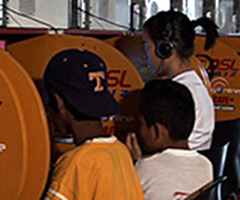The I-Café Industry In Hindsight
 After operating an i-café for seven years (2001 to 2007) and leading the advocacy work for the industry since 2005, I wish to post my personal hindsight about the business that help support my children’s education through college. For almost 3 years now, I had been blogging about the realities, possibilities and requirements that could spell success and failure on a business venture that had turned from being lucrative in its early years to its very competitive status nowadays.
After operating an i-café for seven years (2001 to 2007) and leading the advocacy work for the industry since 2005, I wish to post my personal hindsight about the business that help support my children’s education through college. For almost 3 years now, I had been blogging about the realities, possibilities and requirements that could spell success and failure on a business venture that had turned from being lucrative in its early years to its very competitive status nowadays.
Depending on one’s definition, success in i-café business can be something easy for some but elusive for many. There are those who have i-cafés with few computer units in their residences and for as long as they get enough revenue to pay the utilities and their necessities like food and clothing, they consider the venture as successful for them. But for others, surviving the business without being able to grow it is not a success at all.
The truth is many fails in i-café business but you would not notice it because their number seems to grow by the day. The number of those closing their i-cafés are matched if not outnumbered by new entrants in the business who more likely will join the losers a few months later. I have already discussed in previous articles why most i-café start-ups fail and I want to add a few more hindsight about the business.
- Public Image – the presence of i-cafés does not sit well with the majority of people in a community where they are located. Because of their gaming business models, the parents of minority-age children see them as major disturbance in their studies. Instead of being center for learning, they see i-cafés as gaming dens and place for truant students. The teachers and local government officials regard them as entertainment centers where gamers would soon be addicts and useless members of society.
- Unethical Practices – Except for big companies and conscientious businessmen, many owners of i-cafés resort to practices contrary to moral principles and legal rules of business. To cut down on capital expenditures, majority resort to using pirated software and operate their i-café business without appropriate business permits and licenses. Once operational, most, if not all, do not pay the mandated minimum wage, SSS, Pag-Ibig and PhilHealth insurance for their employees.
- Unorganized Moves – Unlike other industries, the stakeholders in i-café businesses are disorganized. I happened to be the chair of a two-year old national advocacy body for the industry which was organized after many consultations with i-café owners from various regions of the country. After accomplishing some good results in its advocacy work, I presented what I-Café Pilipinas had done and what other things need to be pursued for the industry. The result of the survey I conducted in the forum most frequented by i-café owners is not encouraging and clearly showed the division of minds on matters that could seriously affect the future of the industry.
With the above matters in mind and considering the result of the survey I made, I choose to lie low in my advocacy work for the i-café industry. It’s not exactly that I failed in my advocacy work but more about the mindset of the stakeholders in the industry. They may feel they could do better so they should be allowed to probe it. From now on, I will be passing to them through their online forum any invitation, activity or issue that concerns the industry.
Let me end this article by wishing success and good luck to the current and future stakeholders of the i-café industry in our country. I know there’s something good that the industry can do for the country. The government need i-cafés as partners in providing the marginalized Filipinos with affordable access to the Internet. They just need to harmonize their acts together.




I only survive on Icafe because of my determination and supports from my husband, actually on this business you need to invest regularly for all the accessories that has been break by day to day business, sometimes it exhausted also whenever your attendant will tell you a problem on your units. Good luck to those who wanted to start a business like this, but the truth I am not encouraging others to put a business like this or they will suffer my stress that I am experiencing from time to time
Entering into i-cafe business is now a losing proposition where many owners operate for sometime only to close eventually due to mounting losses. Even, those big companies will realize their operations to be unviable due to their fixation to gaming as parents and local government units will pressure gaming to be excised from operation as you have noted in your blog. As small i-cafes remain hopelessly disorganized, there is no hope for the success of i-cafe business in the long run.